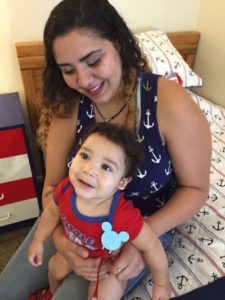One of the sentiments that we hear over and over from our families is what a big impact our parenting classes have on them. To learn more, we caught up with our Director of Education, Ian Vetter, to learn what Saranam’s parenting classes cover and why they are so impactful.
What are the major focuses of our parenting curriculum?
Parenting is a huge job- really, our most important job. What we try to do in our parenting classes is to give parents a framework for understanding their children’s development and help them develop tools that will enhance their family relationships.
Some of our focuses are:
- Strategies for modeling good behavior
- Effective communication strategies between parents and children
- Developing tools to build familial capacity for increased empathy and resilience
- Helping kids increase their social and emotional skills, like building self-esteem, and understanding their emotions
This is one of the things parents consistently point to as a huge success of their time at Saranam. Why do you think parenting classes make such an impact?
Parenting makes up so much of our happiness, our daily life and our future plans, but it is very difficult. At the end of the day every parent is working to give their kids a good life. Getting support from fellow parents and learning useful strategies helps every parent reach that goal.
“I am most proud of my better parenting. Through Saranam parenting classes and counseling I really learned how to better de-escalate my daughter.”
For example, when families come to Saranam they make big adjustments in the flow of their days. Taking time to purposefully craft a family dynamic, a new workable routine, and new ways to bond that meet these changes can make a less stressful home environment.
“I have a better balance between my priorities and needing spend time with my son. I am more patient. I have better confidence so I deal with him better.”
In addition, the more you know about something, the more confident you feel in doing it. Understanding their children better develops a sense of agency and advocacy for parents. And seeing the positive changes in their children builds confidence in their ability to develop this, and all parts, of their new lives, in a way that works best for them. It becomes a building block in the foundations they are setting down for their new lives.
As an organization committed to trauma-informed care, how do our parenting classes help families?
All the families who come to Saranam have undergone some sort of trauma and stress, including experiencing homelessness. A significant part of our programming is devoted to acknowledging the role stress plays in shaping us as human beings. Adverse childhood experiences, trauma, and chronic stress tend to determine how we respond to stressors in our lives and how effective we are at managing them.
“Because of Saranam, my son and I are able to unite and build as strong foundation and bond that’s had been neglected until now.”
Our parenting classes are a safe space for parents. They talk through these things and share ideas as they grow and heal.
Like most aspects of our program, the parenting classes seem intentionally community based. How does this setup enhance what we do in our parenting classes?
Parenting is always easier with a village. Since our parents are both peers and neighbors, using a community-based approach helps them realize the support and resources that are available to them in this space – not just from Saranam, but from each other.
“As a community we shared our knowledge and parenting experience with each other; how do you get through the terrible twos or console the first heartbreak, or even just keeping your sanity during bedtime.”
How do the parenting classes help families move toward their goal of ending homelessness?
This gets to the crux of what two-generational programming is all about; working to enhance the well-being and functioning of the family as a whole.
To begin, when parents have more support and tools at their disposal, they are more effective and can devote more stress-free, fun time to bonding.⇒
That positive parental connection, along with added consistency and decreased conflict, enormously benefits kids and helps them perform better in school and social relationships. ⇒
As parents learn more, they increase their capacity to be strong advocates for their kids. This in turn helps ensure kids are getting what they need academically and emotionally. ⇒
Kids succeed as a result, which gives parents confidence in their ability and capacity to push further in their own goals. ⇒
Finally, as parents reach those goals and move up the income ladder, they can give their kids access to more resources that will help them grow up successfully as well.
It becomes a mutually reinforcing cycle of encouragement and growth.

